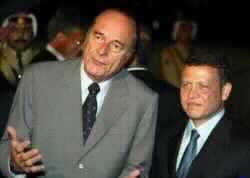HIGHLIGHTS: A Controlled Indisputable Disarmament Mechanism Would Diminish Threat of War, Chirac||UN Security Council Expected to Vote on New Resolution on Iraq Friday||Syria & Jordan Applaud French Position as Balanced||French Speaking Nations Rebuke Washington & Stress Primacy of International Law and The Primordial Role of the United Nations|| STORY: French President Jacques Chirac warned it was far too early to rule out war against Iraq, despite intense diplomatic activity to find a compromise U.N. resolution to deal with Baghdad.
"It is completely premature to make such a prediction," Chirac said after a meeting in Amman with King Abdullah of Jordan.
"My preoccupation is putting sufficient pressure on the Iraqi authorities that a controlled disarmament is indisputable and that the prospects for war therefore diminish."
France, a veto-wielding permanent member of the United Nations Security Council, has led opposition to U.S. proposals for the automatic use of force against Iraq if any member of the Security Council judges it to have impeded weapons inspections.
Security Council members are trying to resolve the deadlock and diplomats say a deal could be reached on a U.S. compromise resolution within days.
U.S. Secretary of State Colin Powell said the United States would introduce a compromise Iraq resolution to the Security Council this week.
Chirac said a "very large majority" of countries shared the French position -- that a new U.N. resolution should not explicitly authorise an attack on Baghdad.
He said after meeting the leaders of Jordan and Syria that both had applauded the French stance as "balanced".
French diplomatic sources said Syrian President Bashar al-Assad had expressed concern about the political and economic repercussions of a conflict in the region.
"They all expressed their opposition to Iraq developing weapons of mass destruction, if that is indeed the case," said Chirac. "That is a point on which there is by and large a consensus."
Powell said the U.S. resolution would cite Saddam's past violations of inspection orders, which date back to shortly after the 1991 Gulf War. He said the resolution would demand new inspections and warn that Saddam would pay a price if he did not comply.
Powell said that while key members of the Security Council -- a reference to France and Russia -- had yet to agree on the proposed resolution, he expected strong support for unfettered weapons inspections demanded in it.
He said that if Saddam refused to permit weapons inspections, "the United States believes that it and like-minded nations...will have all the authority it needs at that point if it chooses to take action".
CALL BY FRENCH-SPEAKING SUMMIT
In Beirut, leaders of French-speaking nations at a summit attended by Chirac rebuked Washington by issuing a statement defending the "primacy of international law and the primordial role of the United Nations".
Iraqi Vice-President Taha Yassin Ramadan said on Sunday that Baghdad was still ready to admit weapons inspectors -- who had cited Iraq's lack of cooperation as their reason for withdrawing four years ago -- under an agreement reached with the United Nations on October 1.
But a government spokesman appeared to cast doubt on whether that offer would still stand if the new U.S. compromise resolution was passed by the Security Council.
"Passing any new resolution that contradicts (earlier) agreements represents a retreat from the stand that the Security Council should take," he said.
PHOTO CAPTION
French President Jacques Chirac (L) addresses journalists with Jordan's King Abdullah II upon his arrival at Amman Marka's airport, October 20, 2002. Chirac arrived in Amman to discuss the situation in Iraq after meeting Syria's President Bashar Al-Assad earlier on Sunday. Photo by Jack Dabaghian/Reuters
- Author:
& News Agencies - Section:
WORLD HEADLINES


 Home
Home Discover Islam
Discover Islam Quran Recitations
Quran Recitations Lectures
Lectures
 Fatwa
Fatwa Articles
Articles Fiqh
Fiqh E-Books
E-Books Boys & Girls
Boys & Girls  Hajj Rulings
Hajj Rulings Hajj Fatwas
Hajj Fatwas














